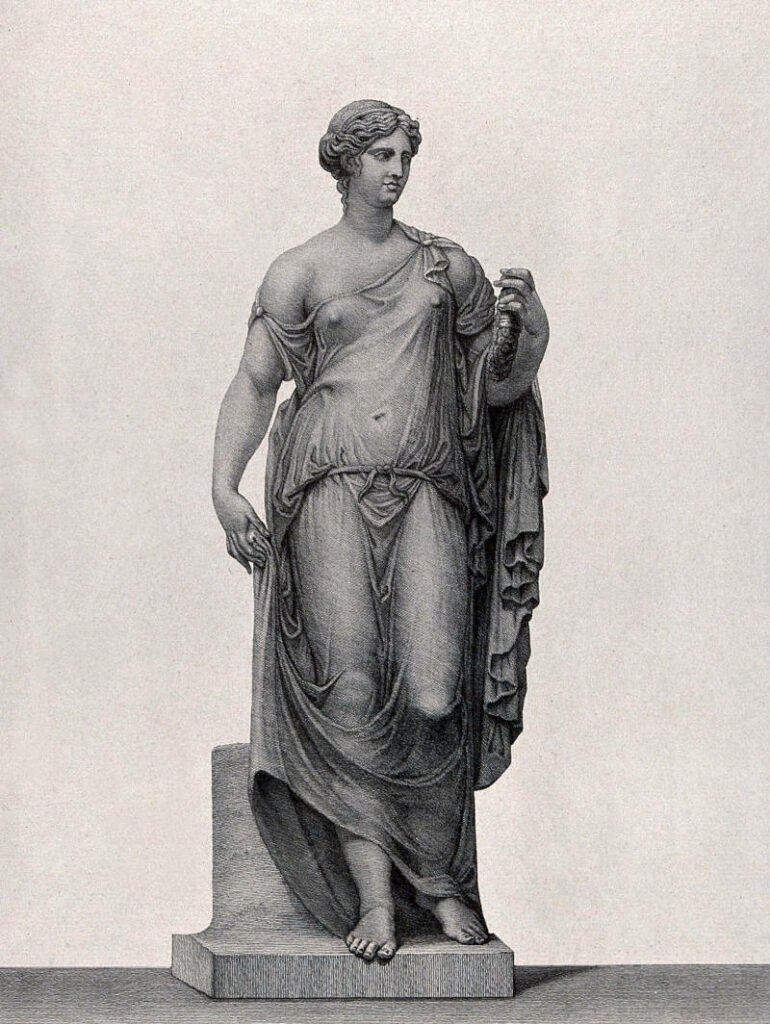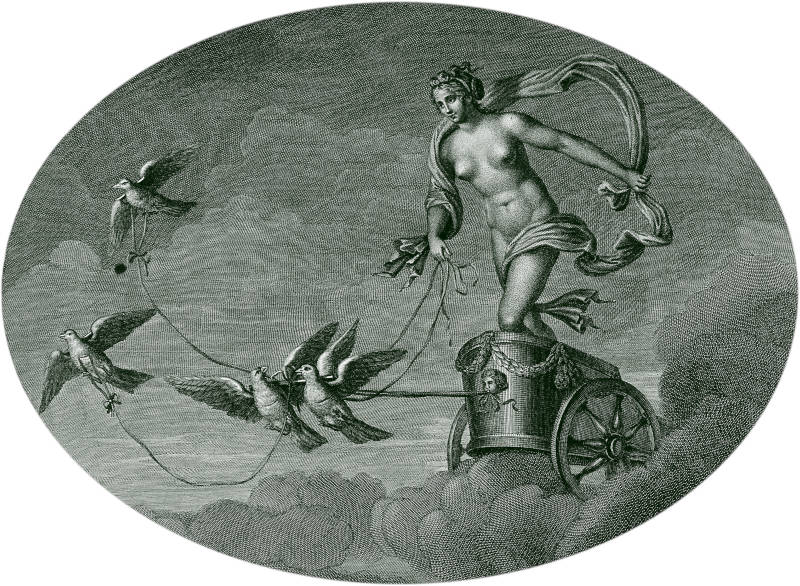Planet Summary
- Temperament: Cold and Moist – Phlegmatic
- Color: Green, White
- Quality: Nocturnal Benefic
- Names: Aphrodite, Ishtar, the Morning/Evening Star
- Rulership: Taurus, Libra
- Metal: Copper
- Keywords: Desire, love, pleasure, sensation, creativity
Early in the morning, before the sun rises, or just after the sunset, it is occasionally possible to see a bright and beautiful star. Venus, known as either the morning or the evening star depending on which phase it is in, has long been associated with themes of pleasure, inspired by the beauty of its light.
When ancient astrologers started developing the field, there were a variety of themes that helped to compose the rich symbolic complexity of each planet. One of those was the appearance of the star in the sky—a dark planet like Saturn was considered ominous and malefic, while the bright and blue Jupiter was seen as the harbinger of good fortune. In the same manner, Venus was viewed as a benefic planet: its brightness was intense and stable, pleasurable to see, without the blood-like color of Mars or the darkness of Saturn, both malefic planets. The beauty of the planet was probably one of the reasons that it became the star of goddesses of love, associated with the Babylonian Ishtar and the Greek Aphrodite.
As the Lesser Benefic, Venus walked alongside Jupiter, the Greater Benefic. Both would be the bearers of good signs, like success, prosperity, love, and pleasure—for a person or a nation. Venus opposes Mars, the Lesser Malefic, and it was said to be capable of balancing its maleficence. It is interesting that Mars, the Greek god of war, was the lover of Venus, the only one capable of calming down the fiery and sanguinary Mars. In the same manner, Venus can diminish the harshness of life through the benefits of love, pleasure, comfort, and even faith.
Goddess of Love

The planet Venus was sometimes called the “Star of Venus” since it was ruled by the goddess of love. For this reason, this star rules love. It is one of the main significators in a chart of relationships, and its position can bring understanding about the romantic partner of a person or their general love life. A well-positioned Venus can be a sign of a good romantic life, full of joy and love, or of a partner who has a good living condition. On the other hand, an ill-positioned Venus can indicate troubles in the love life, difficulties caused by partners, or partners that are frequently in a difficult position in their life. Of course, this depends on a lot of astrological factors.
Venus and the Moon are the two classical signifiers of women in ancient astrological practice. According to the 9th-century astrologer Abu Ma’shar, Venus signifies the mother and younger sisters, but also women in general. If we see Venus in the 10th house in a chart, it can point to a relevant woman in the career of the native, for example.
Besides romance, Venus also rules friendship. After all, it is a main source of happiness in our lives since we are social beings. The good positioning of Venus can indicate great friends, but the poor location of the planet can indicate bad situations like false friends and betrayal.
Leisure, pleasure, art, fun, games, intoxication, parties, and ornaments are other themes ruled by Venus. The connections here are clear since the planet rules the good things in life. Interestingly, these things are considered to be good if the planet is in a good position in a chart but can be the source of problems—like an addiction—if Venus is afflicted in some way. Venus is all about pleasure, for which reason it rules the aforementioned themes. Another theme that Venus was considered to rule in classical times, however, is a little counterintuitive for the materialistic age that we live in: Venus is a signifier of the devotional and religious. Venus is exalted in the sign of Pisces, ruled by Jupiter, the signifier of religion. This fact illustrates the spiritual side of Venus, capable of connecting with higher realms through a more profound sense of love—not a superficial kind of love, but a respectful and joyful devotion.
Venus and the Zodiac
The places where Venus feels at home are its domiciles: Taurus and Libra. It is exalted in Pisces. Its detriment is in the Mars-ruled signs, Aries and Scorpio. Its fall is in Virgo, a Mercury-ruled sign.
Considering the Sun’s position in the signs, Taurus is in the middle of the spring season. Aries inaugurated this season, bringing change and the end of the winter with martial energy. Taurus, however, consolidates spring—everything is beautiful, flowers are blossoming, food is abundant, and the weather is nice. We can see the relationship between Venus and Taurus since it is a time to enjoy life.
Libra opens the fall season. The weather is pleasant, but some things must be done to achieve an adequate balance before winter comes: it is a time of measuring, and, as such, scales are the symbol of Libra. Saturn rules this sign by exaltation, giving it a more sober tone—it is necessary to be responsible at this time or survival will be at stake. However, it is still a time of plenty, a time of harvest when there is plenty of food to feast on.
There is one important difference between the two domiciles of Venus: in the classifications of the ancient astrologers, Taurus is a bestial sign, since it is represented by an animal, and Libra is a humane sign since it is a woman who holds the scale. For this reason, Taurus was considered more of an irrational sign, connected to material pleasures and prone to anger when menaced. Libra, however, is capable of dialogue, since it is human and also an air sign, the element most related to talking. In this sense, we can see an important virtue of Libra present in a well-positioned Venus: the capacity for diplomacy, balancing opposed positions, hearing different versions of a story, and coming to a fair decision.
Pisces, as we have seen, is a place of faith ruled by Jupiter, the lord of religion. Venus in Pisces feels good: it is in a water sign, which is also the element of Venus, a cold and moist planet. For this reason, Venus in Pisces strengthens the capacity to connect with other people, making natives empathetic and sensitive. The loving and nurturing quality of Venus is expanded here and, since it is a sign of Jupiter, the ruler of faith, Venusian energy is directed to a religious and spiritual quality of mind, devotion to higher themes capable of conducting people to better situations.

As we have already seen, Venus and Mars were lovers in Roman and Greek mythology. The goddess of love could pacify even the violent god of war. In astrology, however, the situation is tenser: the domiciles of Venus are places where Mars feels bad, and the contrary is also true. The two domiciles of Mars are the exiles of Venus—Aries and Scorpio. The logic behind that is simple: the battlefield is not a place suited for expressing love, kindness, and devotion. Mars provides places of dispute and quarrel, but Venus seeks ease, connection, and happiness. In Aries, there is open competition and struggle, but in Scorpio, there is tension in the air and conflict can arise unexpectedly.
Virgo is the place of fall for Venus, a debility considered by some ancient astrologers to be worse than exile. This sign brings another dissonant aspect for Venus: the sobriety and intellectuality of Mercury, ruler of Virgo. It is a melancholic sign, ruled by a melancholic planet: it perceives reality in a raw manner, dissecting everything in rational categories. Venus, however, is about mixture, connecting, and dissolving the limits; it is about guiding yourself through emotions and desire, not through calculation. Virgo, in this sense, goes against the nature of Pisces, the opposed sign and exaltation of Venus. There, the connections are favored, but here Venus must deal with the existence of limits that are difficult for the free flow of relations, emotions, and pleasure.
Venus in a Chart
The symbolic meanings of Venus explained through the text are mainly about the pure symbol, destitute of context. However, life is more complex than that, and so is astrology: all significators are altered by their positioning in a chart.
When Venus is well placed and signifies the personality of the native, it is a strong indicator of people with huge magnetism, beautiful, easily making friends, and developing romantic relationships. They tend to be pleasant, kind, fun, prone to involving in activities that bring joy: partying, if extroverts, or resting if introverts. In both cases, the native would seek pleasurable things to do in their contexts, like eating, playing, sleeping, or flirting. The love life of these people could be particularly significant. In some cases, their spiritual life could also be relevant, a place where they would dedicate themselves to what they believe is good and beneficial.
The difference that occurs when Venus is badly placed is its results. In the case aforementioned, all the parties, fun, and pleasure bring good circumstances and luck is on the side of the native. If Venus is ill-positioned, however, there is a tendency to addiction, denial, and escape from reality, and the hunt for pleasure can take the person to bad places, toxic relationships, and attachment to superficiality.
When Venus rules external aspects of someone’s life, it will bring benefit (when well placed) through relationships, women, pleasure-related themes, and devotional spirituality. There is a tendency for a good life, full of joy and peace; of course, this depends on the rest of the chart. If badly positioned, the same themes could bring pain, relationships could be a source of trouble and places of leisure and fun could lead to difficulties. The difference is that these benefits or problems are not caused by the personality of the person but come from outer sources. For example, we can think of a badly placed Venus signifying a younger sister of a person who is addicted to gambling and alcohol and, for this reason, is a source of worries for the native, even if they are a sober and responsible person.
References
- ABU MA’SHAR. The Significations of Venus.
- GUTTMAN, Ariel; JOHNSON, Ken. Mythic Astrology.
- HOULDING, Deborah. Venus: the two-faced goddess.
- LILLY, William. Christian Astrology.
- TOMPKINS, Sue. Aspects in Astrology. A comprehensive guide to interpretation.
- TOMPKINS, Sue. The Contemporary Astrologer’s Handbook. An in-depth guide to interpreting your horoscope.
- VALENS, Vettius. Anthologies.
- WATTERS, Joanna. Introducing Venus.
Images on this page
- venus-piroli: Engraving by F. Piranesi, 1782, after T. Piroli. | Public Domain Mark 1.0
- venus-raphael: Engraving by C. Lasinio after Raphael, 1516. | Public Domain Mark 1.0
- venus-maarten-de-vos: Maarten de Vos (1532-1603), engraving by Jan Sadeler I (1550-1600) | public domain
